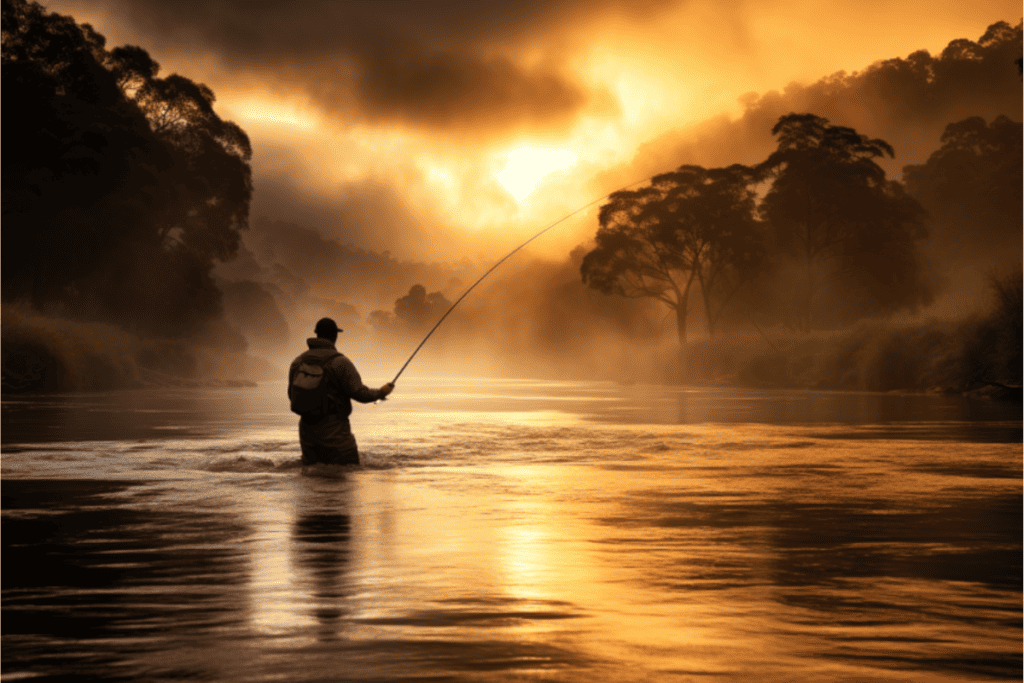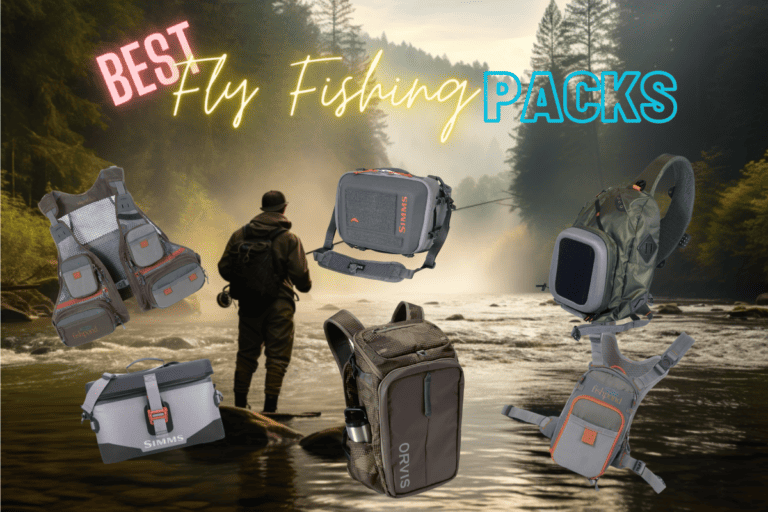Fly Fishing Only Water: Should Tenkara Be Legal Everywhere?

There is on average 76 million fly fishing trips per year.
Yet, you’re puzzled why some forms, like Tenkara, are illegal in ‘Flyfishing Only’ waters. It’s all about the misconceptions, tradition, and strict adherence to rules.
You’re not alone in wanting to understand this, so let’s dive into the history, myths, and ongoing debates surrounding this issue.
Together, we can make sense of this puzzling regulation.
Why Tenkara Should be Legal on “Flyfishing Only” Waters
There’s a compelling argument that Tenkara should be legal on ‘Flyfishing Only’ waters, despite the lack of a reel. The essence of fly fishing isn’t bound to the reel but the technique, the presentation of the fly line, and the bond between the angler and the fish.
Reasons for Tenkara’s Legality:
- Traditional fly fishing method without a reel.
- Aligns with the essence of fly fishing techniques.
- Historically, fly fishing without reels predates the use of reels.
As a fellow angler, you understand that fly fishing is about more than just catching fish. It’s about connecting with nature, about the delicate dance between the fly rod and the fly line, about the thrill of the hunt and the joy of the catch. Tenkara, with its simplicity and focus on technique, embodies these ideals perfectly.
The lack of a reel doesn’t diminish the experience. In fact, it enhances it. Tenkara allows you to feel every twitch and tug, every shift in the water. It brings you closer to the fish, closer to the heart of fly fishing.
The Misconception Surrounding Fly Fishing Legality and Tenkara’s Place
You’re likely confused about Tenkara’s place in the heated debates regarding certain angling regulations, particularly those that could potentially deem it unlawful. You’re not alone. Many in the angling community are grappling with the same concerns.
You see, the main sticking point is how the law is interpreted. A lot of ‘fly fishing only’ regulations suggest the use of a reel, which is where Tenkara comes under scrutiny.
Just to refresh, Tenkara is an ancient method of fishing that predates the use of reels. It’s all about simplicity and getting back to the essence of angling. But here’s where it gets tricky: some folks argue that the language of the regulations means you can’t use Tenkara in ‘fly fishing only’ waters. They claim that spinning, spincast, and casting rods and reels are prohibited.
| Misconception | Fact |
|---|---|
| Tenkara is not fly fishing because it doesn’t use a reel. | The essence of fly fishing is not defined by the reel but by the technique. |
| Tenkara is a modern invention. | Tenkara is a traditional Japanese method of fly fishing. |
But don’t let this dissuade you from your passion. You belong in this community, just like anyone who loves the thrill of catching a trout. Remember, the spirit of the law aims to protect our beloved sport, not to exclude anyone.
Just keep doing what you love and let’s work together to clarify these misconceptions.
The Role and Historical Perspective of Reels in Defining Fly Fishing
It’s important to realize that reels haven’t always been a crucial part of angling, with their use being more contemporary than traditional. You, like many others, might have even pictured fly fishing as inseparable from the reel. Yet, history tells a different story.
Evolution of Fly Fishing:
- Ancient Times: Fly fishing without reels.
- Modern Era: Introduction of reels in fly fishing.
- Recent Years: Resurgence of Tenkara and debate over its legality.
The essence of fly fishing is not in the tools, but in the technique – using the weight of the line to cast a fly. This means that you’re just as much a part of the fly fishing community whether you use a reel or not. You’re not alone in this realization. The debate on ‘paflyfish’ reflects this understanding, highlighting Euro nymphing, a technique that may not always require a traditional fly line.
The True Essence of Fly Fishing: Presentation Over Gear

Ultimately, the true essence of fly fishing isn’t about the gear, but about the presentation. It’s about how you, as an angler, connect with the water and the fish. Forget about the fancy gear and focus on the art of casting, the rhythm of the water, and the thrill of the catch.
Key Differences Between Tenkara and Conventional Fly Fishing:
- Tenkara doesn’t use a reel.
- Tenkara emphasizes technique over gear.
- Tenkara aligns more with the spirit of “fly fishing only” laws.
As a fly fisher, you’re part of a community that values skill over equipment, and tradition over convenience. This is where Tenkara comes in. This form of fly fishing, with its limitations on casting distance, places emphasis on your abilities rather than your gear. It’s not just about hooking a fish, but also giving it a genuine chance to fight back, echoing the spirit of ‘fly fishing only’ laws.
Addressing the Tenkara Legality Debate: Spirit vs. Letter of the Law
Let’s delve into the Tenkara legality debate, focusing on the spirit versus the letter of the law. As of the writing of this post, there are two main states where Tenkara is illegal, New Hampshire and Washington.
You’re part of a community that appreciates the art of fishing, the spirit of the challenge rather than just the gear. So, when it comes to Tenkara, you’re already in tune with its essence and how it aligns with the principles of fly fishing.
However, you may have encountered some uncertainty about its legitimacy due to unclear regulations. While the rules may seem murky, remember that Tenkara not only meets but, according to ‘tenkaratalk‘, surpasses the spirit of fly fishing laws.
This Japanese technique presents more of an angling challenge, keeping you on your toes and deepening your connection with the sport. That’s what fly fishing is all about, isn’t it? Not just the equipment or technique, but the experience, the challenge, and the bonding with nature.
The Growing Popularity of Tenkara and Its Implications for Future Regulations
As Tenkara’s popularity continues to skyrocket, there’s an undeniable call for more comprehensive regulations to safeguard its practice and maintain its spirit.
You, as an enthusiast, are part of an ever-growing community of anglers who have embraced this Japanese fishing style. But with growth comes responsibility.
You’ve likely heard the debate; some states consider Tenkara illegal on ‘fly fishing only’ waters. That’s a bit of a head-scratcher, isn’t it? It’s time to be proactive, to push for clarity in these regulations. After all, you’re not just an angler; you’re a steward of the practice, passionate about preserving the spirit of Tenkara.
Let’s rally together, using our collective voice to advocate for clear, fair regulations. Remember, it’s not just about your right to fish; it’s about protecting the integrity of Tenkara, ensuring that the spirit of the law matches its letter. It’s about creating a space where everyone can enjoy the serenity and simplicity of this ancient fishing technique.
That’s what it means to be part of the Tenkara community. And together, we can protect and nurture this practice that we hold so dear.
Final Thoughts
You might think, ‘Isn’t fly fishing just about the gear?’ But it’s not. It’s the technique, the grace, the connection to nature. That’s why Tenkara should be legal on ‘Flyfishing Only’ waters.
It embodies the true essence of fly fishing. So, don’t let outdated regulations stop you. Embrace the growing popularity of Tenkara and join the debate to shape future rules.
After all, it’s your fishing experience that matters.
Frequently Asked Questions (FAQ)
Q: Should Tenkara be legal everywhere in 2023?
A: Tenkara should be legal everywhere in 2023.
Q: What is Tenkara?
A: Tenkara is a traditional Japanese fly fishing method that uses a long rod, fixed line, and simple presentation techniques.
Q: Why should Tenkara be legal everywhere?
A: Tenkara is a sustainable and low-impact fishing method that allows anglers to enjoy the simplicity and beauty of fly fishing. It can be practiced in various settings and provides opportunities for a wider range of people to participate in the sport.
Q: What is an artificial fly?
A: An artificial fly is a type of fishing lure that is created to imitate natural insects or other prey species. It is commonly used in fly fishing.
Q: Does Tenkara use artificial flies?
A: Yes, Tenkara uses artificial flies to entice fish. Anglers can tie their own flies or purchase them from fly shops.
Q: What are the benefits of Tenkara fishing?
A: Tenkara fishing offers simplicity, ease of learning, and a more intimate connection with the fish due to the direct control and sensitivity provided by the long rod and fixed line.
Q: Is Tenkara suitable for trout fishing?
A: Yes, Tenkara is especially suitable for trout fishing as its techniques and gear are well-suited to the delicate presentations required for trout.



